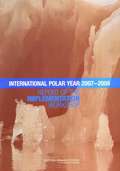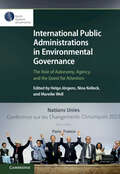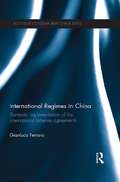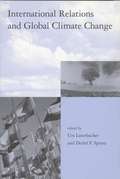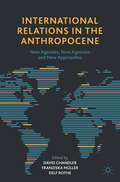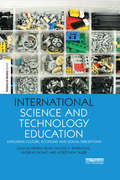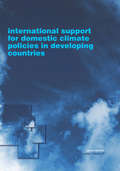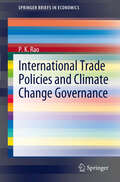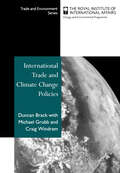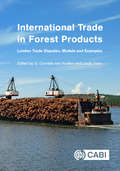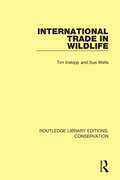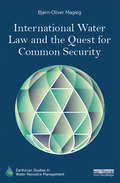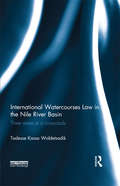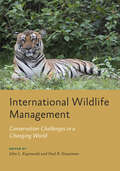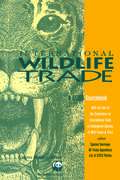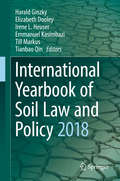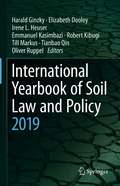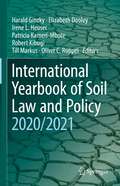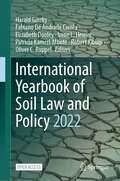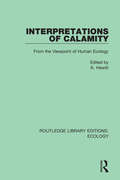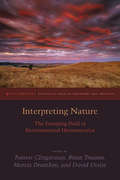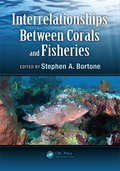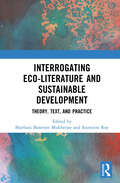- Table View
- List View
International Polar Year 2007-2008: Report Of The Implementation Workshop
by Polar Research BoardThe National Academies Press (NAP)--publisher for the National Academies--publishes more than 200 books a year offering the most authoritative views, definitive information, and groundbreaking recommendations on a wide range of topics in science, engineering, and health. Our books are unique in that they are authored by the nation's leading experts in every scientific field.
International Public Administrations in Environmental Governance: The Role of Autonomy, Agency, and the Quest for Attention
by Helge Jörgens Nina Kolleck Mareike WellCombining theoretical and empirical approaches, this book examines the role that international public administrations play in global environmental politics in the Anthropocene. With chapters written by leading experts in the field, this text offers fresh insight into how international bureaucracies shape global policies in the complex areas of climate change, biodiversity, and development policy. International public administrations are thus recognized as partially autonomous actors with their own interests and motivations, assuming the roles of managers, orchestrators, brokers, or attention-seekers. This comprehensive resource provides scholars and practitioners with valuable insight into environmental policymaking and how international public administrations might be transformed to better address the multiple, fundamental challenges of our century. This is one of a series of publications associated with the Earth System Governance Project. For more publications, see www.cambridge.org/earth-system-governance. This title is also available as Open Access on Cambridge Core.
International Regimes in China: Domestic Implementation of the International Fisheries Agreements (Routledge Contemporary China Series)
by Gianluca FerraroAccording to the Food and Agriculture Organization (FAO) of the United Nations, more than 80% of world’s fish stocks are fully exploited, over-exploited, depleted, or recovering from depletion. Although several international agreements have promoted more responsible fisheries, coastal states have usually maintained national policies that enable higher harvest levels rather than greater conservation of fish stocks, and international agreements for more responsible fisheries have generally experienced a weak domestic implementation. Among the major coastal fishing states, China constitutes the largest fish producer and main exporter in the world, and therefore presents a fascinating case-study for the domestic implementation of international fisheries agreements. This book investigates the degree to which China has complied with the international agreements it has signed, and asks why it is failing to meet expectations. Crucially, it calls for greater emphasis on the political, rather than technical, issues involved in the implementation of international regimes. In turn, it examines how understanding the case of China can help us to develop solutions for improved international compliance in the future. Providing an improved understanding of the implementation of international regimes, alongside an in-depth study of China’s political system, policy-making and compliance, this book will be of great interest to students and scholars of Chinese studies, international relations, public policy, and international law and environmental studies. It will also be useful for policy makers working in the fields of environmental regulation and fisheries management.
International Relations and Global Climate Change
by Urs Luterbacher Detlef F. SprinzThis book surveys current conceptual, theoretical, and methodological approaches to global climate change and international relations. Although it focuses on the role of states, it also examines the role of nonstate actors and international organizations.
International Relations in the Anthropocene: New Agendas, New Agencies and New Approaches
by David Chandler Delf Rothe Franziska MüllerThis textbook introduces advanced students of International Relations (and beyond) to the ways in which the advent of, and reflections on, the Anthropocene impact on the study of global politics and the disciplinary foundations of IR. The book contains 24 chapters, authored by senior academics as well as early career scholars, and is divided into four parts, detailing, respectively, why the Anthropocene is of importance to IR, challenges to traditional approaches to security, the question of governance and agency in the Anthropocene, and new methods and approaches, going beyond the human/nature divide.
International Science and Technology Education: Exploring Culture, Economy and Social Perceptions (The Earthscan Science in Society Series)
by Ortwin Renn Nicole C. Karafyllis Andreas Hohlt Dorothea TaubeEducation in science, technology, engineering and mathematics (STEM) is crucial for taking advantage of the prospects of new scientific discoveries initiating or promoting technological changes, and managing opportunities and risks associated with innovations. This book explores the emerging perspectives and methodologies of STEM education and its relationship to the cultural understanding of science and technology in an international context. The authors provide a unique perspective on the subject, presenting materials and experiences from non-European industrialized as well as industrializing countries, including China, Japan, South Korea, India, Egypt, Brazil and the USA. The chapters offer a wide scope of interpretations and comparative reviews of STEM education by including narrative elements about cultural developments, considering the influence of culture and social perceptions on technological and social change, and applying innovative tools of qualitative social research. The book represents a comprehensive and multidisciplinary review of the current status and future challenges facing STEM education across the world, including issues such as globalization, interdependencies of norms and values, effects on equity and social justice as well as resilience. Overall the volume provides valuable insights for a broad and comprehensive international comparison of STEM philosophies, approaches and experiences.
International Support for Domestic Climate Policies in Developing Countries
by Karstan NeuhoffThis volume examines how international cooperation can support implementation of domestic climate policies in developing countries. Six case studies explore the domestic drivers and barriers for policies with climate (co-)benefits in developing countries and show that international support can help to overcome these constraints by providing additional resources for incremental policy costs, technical assistance, and technology cooperation to build local capacity. Cooperation can also contribute to robust institutional frameworks and government policies that facilitate increased private sector investment, which supports low-carbon production and consumption. Any such cooperation has to be anchored in domestic initiatives - building on stakeholder support for policies with climate co-benefits. The studies also examines the important role played by policy indicators in successful policy implementation and how they can be linked to international incentive schemes. The contributions in this volume examine cases from institutional and national perspectives from across the globe and find that, with common but differentiated responsibility for climate policy, developed countries have to contribute more towards technological and financial support in developing countries.
International Trade Policies and Climate Change Governance
by P. K. RaoThis work offers a synthesis of the current approaches toward an integration of international trade and climate change, with a view to fostering potential improvements in policies and institutions affecting these. A number of pragmatic measures are proposed with reference to the WTO and the United Nations Framework Convention on Climate Change (UNFCCC) regimes, which are expected to contribute toward enhanced climate change governance, as well as promoting international trade.
International Trade and Climate Change Policies
by Duncan Brack with Michael Grubb and Craig WindramFocusing on the likely impacts on trade of the UN Framework Convention on Climate Change and the Kyoto Protocol, this book examines the actual and potential conflicts between whether liberalization of trade undermines the efforts of industrialised countries to mitigate climate change. It will be essential reading for environmental economists and those engaged in international environmental relations and policy.
International Trade in Forest Products: Lumber Trade Disputes, Models and Examples
by Craig Johnston Harry Nelson Joseph Buongiorno Jinggang Guo Xintong Li Fatemeh Mokhtarzadeh Prakash Nepal Jeffrey Prestemon Brad StennesBecause of the long-standing Canada-U.S. lumber trade dispute and the current pressure on the world's forests as a renewable energy source, much attention has been directed toward the modelling of international trade in wood products. Two types of trade models are described in this book: one is rooted in economic theory and mathematical programming, and the other consists of two econometric/statistical models--a gravity model rooted in theory and an approach known as GVAR that relies on time series analyses. The purpose of the book is to provide the background theory behind models and facilitate readers in easily constructing their own models to analyse policy questions that they wish to address, whether in forestry or some other sector. Examples in the book are meant to illustrate how models can be used to say something about a variety of issues, including identification of the gains and losses to various players in the North American softwood lumber business, and the potential for redirecting sales of lumber to countries outside the United States. The discussion is expanded to include other products besides lumber, and used to examine, for example, the effects of log export restrictions by one nation on all other forestry jurisdictions, the impacts of climate policies as they relate to the global forest sector, and the impact of oil prices on forest product markets throughout the world. This book will appeal to practising economists and researchers who wish to examine various policies that affect international trade, whether their interest is local or international in scope. Because the book provides the theoretical bases underlying various models, students and practitioners will find this a valuable reference book or supplementary textbook.
International Trade in Wildlife (Routledge Library Editions: Conservation #2)
by Tim Inskipp Sue WellsOriginally published in 1979 International Trade in Wildlife is a product of the 1973 Convention on International Trade in Endangered Species of Wild Fauna and Flora conference, containing the full text of the CITIES convention. The volume outlines the animals and plants controlled by CITIES, and describes the protective policies put in place to protect endangered plants and animals. It gives a detailed background to the international traffic in monkey’s, spotted cats, whales, ivory, parrots, tortoises, marine turtles, crocodiles, butterflies, sponges and rare orchids at the time of publication and acts as a comprehensive document on the conservation policies enacted through CITIES, as well as facts surrounding the decline of endangered species. Although published over 40 years ago, the document still offers a comprehensive and useful guide to conservation and will be an important historical document for environmental policy makers and conservationists alike.
International Water Law and the Quest for Common Security (Earthscan Studies in Water Resource Management)
by Bjorn-Oliver MagsigThe world’s freshwater supplies are increasingly threatened by rapidly increasing demand and the impacts of global climate change, but current approaches to transboundary water management are unsustainable and may threaten future global stability and international security. The absence of law in attempts to address this issue highlights the necessity for further understanding from the legal perspective. This book provides a fresh conceptualisation of water security, developing an operational methodology for identifying the four core elements of water security which must be addressed by international law: availability; access; adaptability; and ambit. The analysis of the legal framework of transboundary freshwater management based on this contemporary understanding of water security reveals the challenges and shortcomings of the current legal regime. In order to address these shortcomings, the present mindset of prevailing rigidity and state-centrism is challenged by examining how international legal instruments could be crafted to advance a more flexible and common approach towards transboundary water interaction. The concept of considering water security as a matter of ‘regional common concern’ is introduced to help international law play a more prominent role in addressing the challenges of global water insecurity. Ways for implementing such an approach are proposed and analysed by looking at international hydropolitics in Himalayan Asia. The book analyses transboundary water interaction as a ‘case study’ for advancing public international law in order to fulfil its responsibility of promoting international peace and security.
International Watercourses Law in the Nile River Basin: Three States at a Crossroads
by Tadesse Kassa WoldetsadikThe Nile River and its basin extend over a distinctive geophysical cord connecting eleven sovereign states from Egypt to Tanzania, which are home to an estimated population of 422.2 million people. The Nile is an essential source of water for domestic, industrial and agricultural uses throughout the basin, yet for more than a century it has been at the centre of continuous and conflicting claims and counter-claims to rights of utilization of the resource. In this book the author examines the multifaceted legal regulation of the Nile. He re-constructs the legal and historical origin and functioning of the British Nile policies in Ethiopia by examining the composition of the Anglo-Ethiopian Treaty of 1902, and analyses its ramifications on contemporary riparian discourse involving Ethiopia and Sudan. The book also reflects on two fairly established legal idioms - the natural and historical rights expressions – which constitute central pillars of the claims of downstream rights in the Nile basin; the origin, essence and legal authority of the notions has been assessed on the basis of the normative dictates of contemporary international watercourses law. Likewise, the book examines the non-treaty based claims of rights of the basin states to the Nile waters, setting out what the equitable uses principle entails as a means of reconciling competing riparian interests, and most importantly, how its functioning affects contemporary legal settings. The author then presents the concentrated diplomatic movements of the basin states in negotiations on the Transitional Institutional Mechanism of the Nile Basin Initiative (NBI) - pursued since the 1990’s, and explains why the substance of water use rights still continued to be perceived diversely among basin states. Finally, the specific legal impediments that held back progress in negotiations on the Nile Basin Cooperative Framework are presented in context.
International Wildlife Management: Conservation Challenges in a Changing World (Wildlife Management and Conservation)
by John L. Koprowski and Paul R. KrausmanA call for wildlife conservationists to transcend the boundaries of locality, share best practices, and unite with a common voice to influence global policy.Habitat loss, disease management, predator-human conflict, illegal trade—these are among the many conservation challenges faced by wildlife experts around the world. But how wildlife professionals approach these issues has historically been geographically fragmented. By providing a broad perspective on issues faced by wildlife on an international scale, the authors of International Wildlife Management make vital connections, drawing attention to underlying causes and strategies for mitigation that may look surprisingly similar from Montana to Zimbabwe. Bringing together wildlife professionals from around the globe to discuss shared challenges, International Wildlife Management• examines widespread patterns of wildlife loss• covers key conservation strategies, including species reintroduction, community engagement, and wildlife commerce• explores the urgent concerns of climate change, habitat loss and fragmentation, invasive species, and poaching• reviews major organizations involved in wildlife management at an international level, highlighting examples of cooperation among groups and nations in effective wildlife management efforts• features stories of success and struggle from authors across 17 countries on 6 continents This timely and thorough overview thinks big by assessing threats to wildlife on a global scale. Wild creatures don't recognize artificial geographic borders. This useful compendium demonstrates that researchers and scientists should follow their lead.
International Wildlife Trade: A Cites Sourcebook
by Ginette Hemley Kathryn FullerFor more than two decades, the Convention on International Trade in Endangered Species of Wild Fauna and Flora, known as CITES, has been one of the largest and most effective conservation agreements in the world. By regulating international commerce in certain species -- from African elephants and exotic birds to hardwoods and bulbs -- the treaty limits trade in species that are in genuine need of protection while allowing controlled trade in species that can withstand some level of exploitation.In addition to explaining how CITES operates, this definitive reference includes: the full text of the CITES treatyCITES Appendices I, II, and III a list of Parties as of March 1994 a list of reservations by Parties as of October 1993 Chapters address the status of highly threatened species such as elephants, rhinos, and tigers as well as other heavily exploited species including parrots, primates, and bears.International Wildlife Trade provides a valuable overview of wildlife trade issues, and of the strengths and weaknesses of the current treaty.
International Yearbook of Soil Law and Policy 2018 (International Yearbook of Soil Law and Policy #2018)
by Harald Ginzky Irene L. Heuser Tianbao Qin Elizabeth Dooley Emmanuel Kasimbazi Till MarkusThis book presents an important discussion on urbanization and sustainable soil management from a range of perspectives, addressing key topics such as sustainable cities, soil sealing, rehabilitation of contaminated soils, property rights and liability issues, as well as trading systems with regard to land take.This third volume of the International Yearbook of Soil Law and Policy is divided into four parts, the first of which explores several aspects of the topic “urbanization and sustainable management of soils.” The second part then covers recent international developments, while the third part presents regional and national reports, and the fourth discusses cross-cutting issues. Given the range of key topics covered, the book offers an indispensible tool for all academics, legislators and policymakers working in this field. The “International Yearbook of Soil Law and Policy” series discusses central questions in law and politics with regard to the protection and sustainable management of soil and land – at the international, national and regional level.
International Yearbook of Soil Law and Policy 2019 (International Yearbook of Soil Law and Policy #2019)
by Harald Ginzky Irene L. Heuser Tianbao Qin Elizabeth Dooley Emmanuel Kasimbazi Till Markus Robert Kibugi Oliver RuppelThis book presents an important discussion on the implementation of sustainable soil management in Africa from a range of governance perspectives. It addresses aspects such as the general challenges in Africa with regard to soil management; the structural deficiencies in legal, organizational and institutional terms; and specific policies at the national level, including land cover policies and persistent organic pollutants.This fourth volume of the International Yearbook of Soil Law and Policy is divided into four parts, the first of which deals with several aspects of the theme “sustainable soil management in Africa.” In turn, the second part covers recent international developments, the third part presents regional and national reports (i.a. Mexico, USA and Germany), and the fourth discusses cross-cutting issues(i.a. on rural-urban interfaces). Given the range of key topics covered, the book offers an indispensible tool for all academics, legislators and policymakers working in this field.The “International Yearbook of Soil Law and Policy” is a book series that discusses central questions in law and politics with regard to the protection and sustainable management of soil and land – at the international, national and regional level.
International Yearbook of Soil Law and Policy 2020/2021 (International Yearbook of Soil Law and Policy #2020)
by Harald Ginzky Irene L. Heuser Oliver C. Ruppel Elizabeth Dooley Till Markus Robert Kibugi Patricia Kameri-MboteThis book presents an important discussion on land tenure rights for the effective implementation of sustainable soil management provisions. It investigates a variety of aspects, such as the clash of modern and traditional tenure concepts, forms of illegal or illegitimate land acquisition, and the preconditions for legal and legitimate investments. In addition, the book analyses the challenges to ensuring secure land tenure rights in Africa and in Germany. Lastly, it provides information on the role of women in this context.This fifth volume of the International Yearbook of Soil Law and Policy is divided into four parts, the first of which deals with various aspects of the theme “Land Tenure Rights and Sustainable Soil Management”. The second part covers recent international developments, the third part presents regional and national reports, and the fourth discusses overarching issues. Given the range of key topics covered, the book offers an indispensable tool for all academics, legislators and policymakers working in this field.The “International Yearbook of Soil Law and Policy” series discusses central questions in law and politics with regard to the protection and sustainable management of soil and land – at the international, national, and regional level.
International Yearbook of Soil Law and Policy 2022 (International Yearbook of Soil Law and Policy #2022)
by Harald Ginzky Irene L. Heuser Oliver C. Ruppel Elizabeth Dooley Robert Kibugi Patricia Kameri-Mbote Fabiano De Andrade CorrêaThis open access book presents an important discussion on the interface between sustainable soil management and climate mitigation and adaptation. It investigates a variety of aspects in this context, such as the political and societal consequences for countries in the Global South, an assessment of the outcomes of the UNFCCC Conference of Parties held in Glasgow, appropriate legal instruments to promote desealing, regulatory concepts for negative emissions in soil and land use, the debate in Europe on carbon uptake in soils and the climate-related policy of the Convention on Biological Diversity. Lastly, it provides information on recent court rulings on climate mitigation in Germany and Australia and their relevance for sustainable soil management.This sixth volume of the International Yearbook of Soil Law and Policy is divided into four parts, the first of which deals with various aspects of the theme “Climate Mitigation and Adaptation and Sustainable Soil Management.”The second part covers recent international developments, the third presents regional and national reports, and the fourth discusses overarching issues. Given the range of key topics covered, the book offers an indispensable tool for all academics, legislators and policymakers working in this field. The “International Yearbook of Soil Law and Policy” series discusses central questions in law and politics with regard to the protection and sustainable management of soil and land – at the international, national, and regional level.
Internodes
by Ken Belford BelfordMoving with nomadic grace across the terrain of his previous book, Decompositions, the poetic language of Ken Belford in Internodes shares similar roots, traversing decades at the speed of a search query - pressing onward through Hazelton, the Bulkley Valley, and the unroaded head-waters of the Nass River in the Damdochax Valley - and meanwhile coming to terms with a poetry that "is lived" on the rugged streets of Prince George.In this twenty-first-century evolution, and one may say "mutation," of Marshall McLuhan's oft-repeated adage that "the medium is the message," Belford's text takes into account the nature of viral marketing and the impact of similar forms of social "trending" on our lives and our language, challenging linearity and order in favour of a work that may be read forward or backward or experienced with an abrupt sense of intimacy, in media res.Whether reflecting upon the internodal segment that is a vital part of a nerve cell; upon the relationship between the nodes and internodes of a plant stem; or upon the internode merely as an interstice of jargon amid connections we forge through high-speed telecommunication and wireless networks, the text invites the reader to make an informed decision before inviting others to "Like," to "Favourite," or to otherwise invest their social currency in Internodes.In addition to perceiving the poem as the "means of transmission" over time, Belford's poetic lines welcome readership as a form of collaborative action and agency in an age of crowdsourcing and flash mobs - and also as a form of ongoing social process that is sensitive to the life and demise of many of the decision trees that ultimately nourish our wavering notions of the future.
Interpretations of Calamity: From the Viewpoint of Human Ecology (Routledge Library Editions: Ecology #4)
by K. HewittOriginally published in 1983, Interpretations of Calamity provides a provocative critique of the ‘dominant view’ of research into natural hazards. Throughout the world, there are now many people professionally engaged in the mitigation and control of risks & hazards, and the impact of continuing economic development will ensure that they are fully employed. There is a wealth of perspectives in the book, including weather and wheat yields in the Soviet Union and Canada, an historical view of underdevelopment and hazards in Ireland and the impact of a response to drought in southern Africa, the Sahel and the Great Plains of the USA. The book reflects the major themes of hazards in the context of economic development and social change. Most of the case studies are from the rural and agriculture scene. This book provides a unique view of the vital importance of food production and of the considerable, and sometimes calamitous, impact that frost, flood, storm and drought have on the wellbeing of millions of people and on the stability of the international economic system.
Interpreting Nature: The Emerging Field of Environmental Hermeneutics (Groundworks: Ecological Issues in Philosophy and Theology)
by Brian Treanor Martin Drenthen David UtslerModern environmentalism has come to realize that many of its key concerns—“wilderness” and “nature” among them—are contested territory, viewed differently by different people. Understanding nature requires science and ecology, to be sure, but it also requires a sensitivity to history, culture, and narrative. Thus, understanding nature is a fundamentally hermeneutic task.
Interrelationships Between Corals and Fisheries
by Stephen A. BortoneInterrelationships Between Corals and Fisheries is derived from a workshop held by the Gulf of Mexico Fishery Management Council in Tampa, Florida in May 2013, where world authorities came together to discuss the current problems in managing tropical fisheries and offered suggestions for future directions for both researchers and environmental reso
Interrogating Eco-Literature and Sustainable Development: Theory, Text, and Practice
by Sharbani Banerjee Mukherjee and Soumitra RoyThis book examines the issues of ecological crisis and sustainable development through critical reading of literary texts. By analysing writings of Rabindranath Tagore, Amitav Ghosh, Gerard Manley Hopkins, Hannah Arendt, and Lawrence Buell, it discusses themes like oriental representations of ecological consciousness; environmental evocations; misogyny and its postmodern creations; tracing nature’s footprints in English literature; statelessness and consequent environmental refugees; ecocriticism and comics; and, absolute trust in the goodness of the earth. The volume argues that within the ambit of debates between ecological threats and socio-economic concerns, culture plays a vital role particularly in relation to parameters such as identity and engagement, memory and projection, gender and generations, inquiry and learning, wellbeing and health. This book will be of interest to scholars and researchers of cultural studies, English literature, social anthropology, gender studies, sustainable development, environmental studies, ecological studies, development studies, and post-colonial studies.
Interrogating Travel: Guidance from a Reluctant Tourist
by Paul LindholdtNever in human history has travel been so accessible to so many. But—amid an escalating climate crisis that threatens the homes of vulnerable people across the world—has the human cost of trekking the globe become too high? Paul Lindholdt links firsthand narratives with research about the travel trade, telling stories of his reluctant voyages while arguing that carbon-intensive trips abroad may be offset if adventurers come to know and love the landscapes closer to home. Tourism may be the planet’s largest industry, but Interrogating Travel advises readers to stay mindful of the consequences of their journeys, whether visiting local getaways or some of Earth’s most remote locations.
